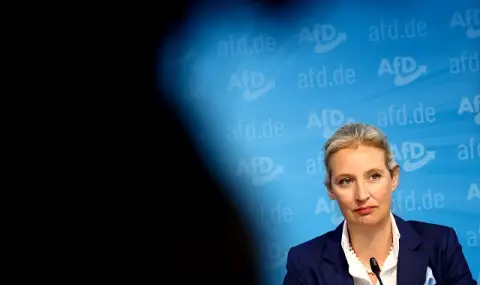The right-wing populist "Alternative for Germany" nominated its leader Alice Weidel as a candidate for the chancellor post. She likes to provoke and does not at all fit into the image of the "traditional family" imposed by AzG.
She is part of a small minority: Alice Weidel is one of nine women in the parliamentary faction of her Alternative for Germany party. (AzG). There are 69 men there. The share of women in this right-wing populist party is only 11.5%. In no other party is the quota so low. In the others, it is between 24.5% (CDU/CSU) and 59.3% (Green Party).
But in political terms, Weidel's weight is great: she shares the chairmanship with Tino Hrupala - both in the party and in the parliamentary faction of the AzG. The two have been together at the top since 2021. Then the party did not perform particularly well in the parliamentary elections - it won only 10.3%. In 2017, they were 12.6%.
Record results in 2024 provincial election
Since then, however, things have only gone forward for AzG. In 2024, in the local elections in Hesse, the party received 18.4%, and in Thuringia - 32.8%. In the national polls "Alternative for Germany" is trusted up to 20%. In the states of Saxony-Anhalt, Saxony and Thuringia, it is categorized by the constitutional protection authorities as a proven right-wing extremist party.
Against the looming elections for the Bundestag in September 2025, the success at the provincial level prompted the AZG to nominate a candidate for the chancellor post - Alice Weidel. The 45-year-old politician should be officially elected at the congress in March next year. She has no real chance of becoming chancellor, because even if AzG takes first place in the elections, no party would want to enter a coalition with her.
Margaret Thatcher - an example of Alice Weidel
That is why Alice Weidel can only dream of following the path of her idol - Margaret Thatcher. "I am impressed by her biography, her ability to swim against the current, even when it is unpleasant,", says the leader of the AzG in an interview about the Prime Minister of Great Britain, who ruled between 1979 and 1990.
Thatcher was called the Iron Lady because she steadfastly followed her radical economic liberal course. Her credo: low taxes, fewer state subsidies, privatizations - a course that matches the economist and one-time business consultant Weidel. "Thatcher took over Britain when the country was at rock bottom economically and got it back on its feet."
"We are trying to reform the EU"
When in 2013 Weidel joined the "Alternative for Germany" which had been created just a few months earlier, it was a Eurosceptic and national liberal party in program terms. Since then, the positions have not changed, the chancellor candidate believes. "We are trying to change the EU," she told a German publication in August. If the EU reform fails, each country should be given the opportunity to decide with a referendum whether to remain in the Community or not, she added.
In the same interview, Weidel rejects claims that Europe is turning to the right - she even defends the leader of the extremist party wing, Björn Höcke. He has already been condemned many times for openly using National Socialist slogans. "His provocativeness waned. He is doing excellent work in Thuringia. I find the cases against him ridiculous and controversial." And these words are addressed to a politician who, according to a court decision, can be defined as a "fascist".
Weidel herself also provokes with pleasure, as she admits. In 2018, in the Bundestag, she called asylum seekers "subsidized men with knives" and Muslim children "girls in headscarves", for which she was openly reprimanded by the then speaker of the parliament, Wolfgang Schäuble.
She justifies the expression "girls with headscarves"
"Polarization is a stylistic device for provoking debate," Weidel said of his speech a few days later. With the word "girls with headscarves" she wanted to draw attention to the fact that Germany had a problem with conservative Islam, which from her point of view was incompatible with the Constitution.
Is Weidel a provocateur? Perhaps yes, given that her personal life has met with prejudice even within her own party. She lives with a woman originally from Sri Lanka. The two have two adopted children. This is very far from the ideas of an ideal of the "Alternative for Germany". Support for the traditional family is explicitly written in the party program: "In the family, the mother and the father bear joint responsibility for their children."
The future candidate for the position of chancellor of the AzG, who lives in Germany and in Switzerland, in no way embodies this position of her party. But this is not a problem for Alice Weidel, who said back in 2017: "There may be some resentment, but there is that in other parties as well."
